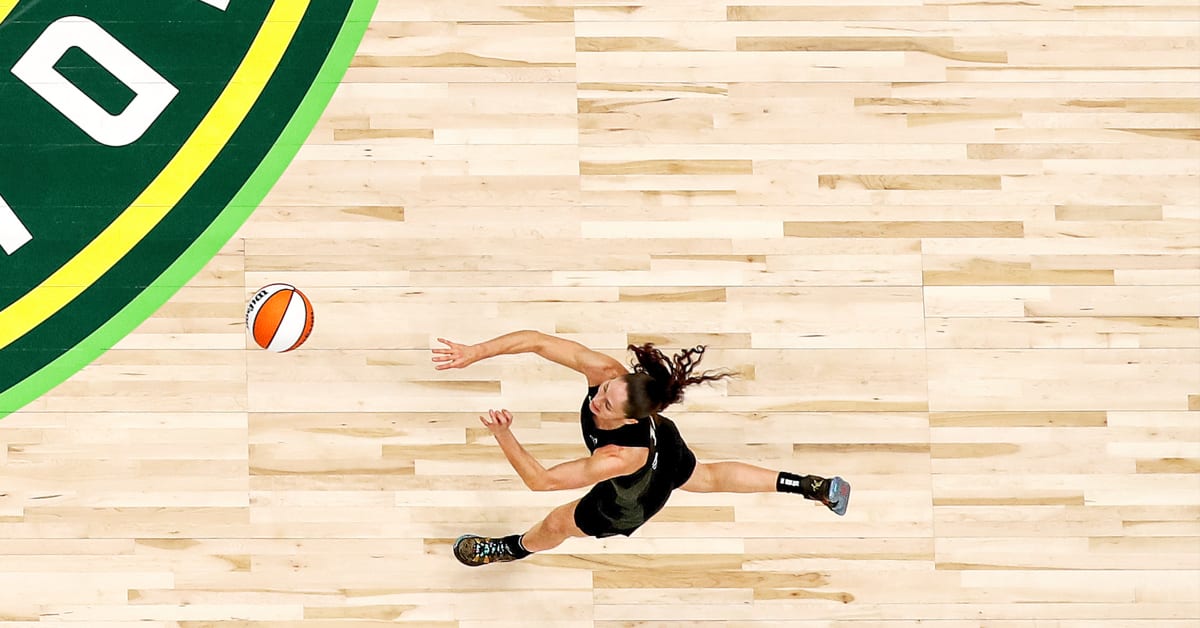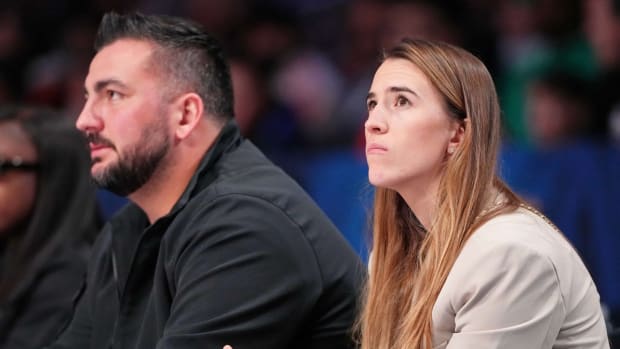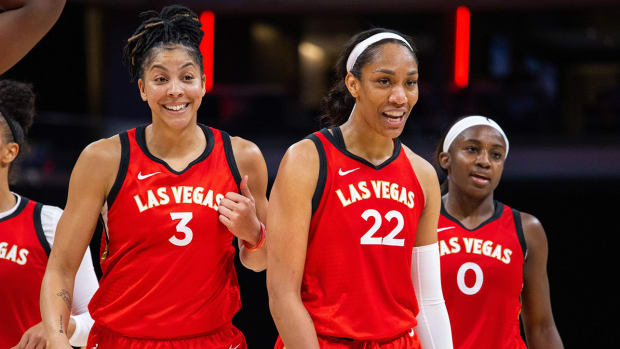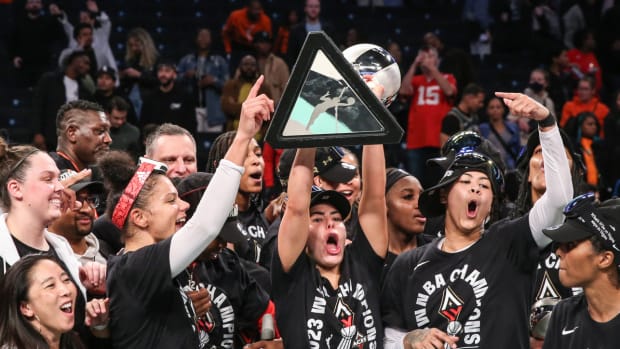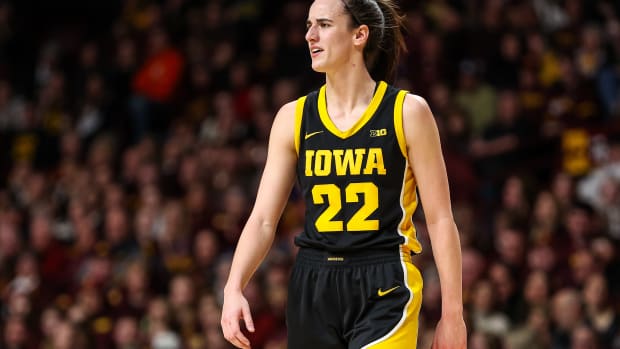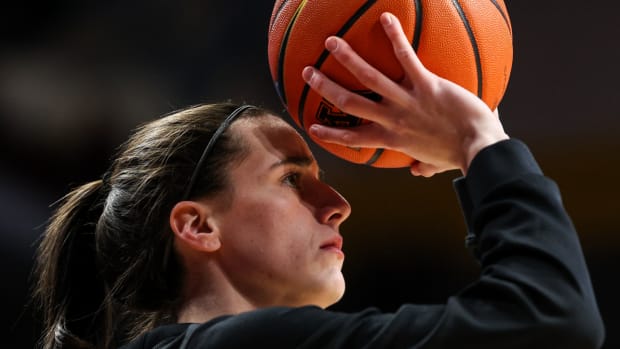Dan Hughes flew in for the culmination. He saw no other choice. For weeks, he shifted his schedule around, moving appointments and canceling a visit from a son who’s in the Air Force, then jetting to Texas to do the visiting himself. He booked another flight to Sea-Tac Airport and a downtown hotel, then secured the most impossible ticket in town.
He came, like so many others, to celebrate Sue Bird.
Hughes coached Bird and coached against her and both experiences left equal-but-opposite impressions. While helming the San Antonio Silver Stars, he once called a late timeout and begged every player in the huddle to follow one simple rule. Don’t leave Sue. They did. She won. “Almost killed me,” Hughes says. “Didn’t sleep for a week.” While coaching the Storm, he got a bird’s-eye view when his point guard tipped one victory with 14 fourth-quarter points. Best sleep he had in years.
Hughes considers Bird one of the greatest shotmakers that basketball has ever seen. He compares her leadership skills to another former player, Becky Hammon, a captain so renowned for guidance she became a coach. When someone says point guard, whether in men’s or women’s basketball—Hughes holds decades of experience in both—Bird’s image is the first that springs to mind. “Like quarterback/Tom Brady, ” he says.
Over time, beyond the skills and accolades, Hughes came to marvel most at how many people she connected. Hence his drop-everything return to Seattle, where the largest crowd in the Storm’s history assembled Aug. 7 for Bird’s final regular-season home game. A local hoops legend tuned in to the broadcast. A retired sports columnist hunted for a ticket. Two freelance journalists bought their own. A pivotal coach flew in from Connecticut. A basketball executive traveled in from Denver. A famous musician wanted to attend but couldn’t shake free from another tour.
All owed their interest to her impact. Bird changed women’s college basketball, with two national titles, helping turn UConn into a powerhouse. She elevated the U.S. national team, with five Olympic gold medals. She drove rampant growth in the WNBA, with four championships, 13 All-Star nods and a league-record 3,234 assists. But her deepest impression was also her most improbable, organic and direct.
It happened in Seattle. It happened to Seattle. It happened because a point God with East Coast roots decamped in 2002 to a faraway city she had hardly visited. She desired only to turn a new and fragile franchise into a perennial contender in a league promising to highlight women’s hoops.
Bird’s home finale (regular-season edition) came two decades later, after almost 19 seasons and some 630 games played and nearly 7,000 points scored. The lead-up unfolded like a Bird-specific Mad Libs exercise—with blanks reserved for insert word that speaks to longevity and lasting, transcendent impact. Suggested nouns: mainstay, pillar, Brady-esque.
“Look around that arena tomorrow,” Hughes says on Saturday afternoon. “We’re all gonna have our Sue Bird stories. All of us.”
Before Seattle native Jamal Crawford starred in NBA venues, he worked in one, lugging food packages from the Key Arena basement to various concession stands. Whenever possible, he stopped and stared at the court where Gary Payton jawed and Shawn Kemp dunked. Those mid-1990s SuperSonics ballooned the basketball incubator that became a local hoops scene replete with future pros. Like Bird, they gave kids like Crawford a “view unlike any we’d seen before.”
Sports in the Emerald City changed that decade, and not just in the NBA. Superstars descended, and a place bereft of championship history—one major title (Sonics, 1979)—started to hope and believe that maybe they all could find athletic happiness after all. Kids wore hats backward to emulate Ken Griffey Jr., imitated the smooth swing of Edgar Martinez and destroyed Nerf hoops with Kemp imitations.
As a Tacoma native obsessed with sports, I fell firmly into the local sports camp. I hung posters of Griffey and Kemp on walls and collected pennants of local teams. My dad took me to the Kingdome every year for Seahawks-Broncos. We also caught the final game of the 1995 American League championship series; the Mariners lost, setting the table of pain for all to come.
This stretch gave hope to thousands of hardened souls who started to return to stadiums—or decided to try the local pro teams on for fit. But as the years went by, and so many elite players—Walter Jones, Alex Rodriguez, everyone above—retired without rings or won them away from Seattle, local supporters became tethered to disappointment. The crushing blows to so many souls became expected, part of the local sports existence.
That became the Seattle fan’s duality, a shared torture chamber that spanned a generation. Blessed by superstars and cursed by the rings they could not deliver, which only made so many so-close seasons hurt that much more.
Seattle got young A-Rod and … old Robinson Canó. It got Kevin Durant, for one season, at age 19—and a pro basketball team stolen and shipped, er, relocated, to the NBA hinterlands. It got Washington’s college football championship in 1991—but not a consensus title in the polls and rules violations that led to the ouster of legendary coach Don James.

While an entire generation of Seattle sports fans saw numerous star athletes leave their city to play elsewhere, Bird stayed—and won.
Erick W. Rasco/Sports Illustrated
That’s the crux. Disaster and euphoria hold hands on the Seattle sport scene; each there, ever present, apart and yet never far away.
Bird was different. She flipped typical conceptions about the city and its superstars the … bird. She stayed. She ruled. She won; daily, weekly, yearly; in Seattle and Russia and international competitions. She won every damn thing, like she was playing somewhere else. Which begs the question: Is Sue Bird the single most impactful athlete in the city’s history?
Consider her our Kevin Bacon, the soul of the city’s sporting ambitions around which everything—and everyone else—rotates. Her career serves as connective tissue for Seattleites of Crawford’s generation, her milestones markers for our own lives. Crawford bought season tickets in the same arena where he once worked simply to watch her. He recalls one pregame in Miami spent screaming at a locker room television for a 2005 playoff contest. He remembers winning the NBA’s Sixth Man Award around when the Storm won its second title (’10) and his pride in the city’s sports momentum.
This is his adult life: Sonics’ sale, Storm’s survival, Mariners’ drought and Seahawks’ rise. The new stadiums. The renovated older stadium. The newer teams, in other leagues. The fight for the NBA’s return. The failed bid for the Sacramento Kings. So much delusional expansion talk.
Everything in Seattle sports changed.
Except for one: Suzanne Brigit Bird.
On the morning of the culmination, a retired dean of Seattle sports journalism stops by a coffee shop near Climate Pledge Arena. Already, an hour before the gates open, hundreds of fans huddle near the entrances. They wear Sue Bird 4 Ever T-shirts and her jerseys, No. 10 ubiquitous. They carry canvas rainbow tote bags and Bird bobbleheads and cameras, while fighting for parking and hunting for shade on a blistering summer morning in the middle of a heat wave. “A lovefest,” Steve Kelley says.
Bird considered retiring after 2021, only to be convinced, in part, by the home crowd chanting “One! More! Year!” Last October, she turned 41. In January, she confirmed another season via an “OK” delivered on her Instagram account. By May, she had taken a pay cut—she would play for the veteran minimum ($72,141, plus bonuses and endorsement income).
Like Kelley, fans across the region circled the finale on their calendars while clinging to cautious optimism for one final glorious run. The salary reduction helped Seattle retain Breanna Stewart and Jewell Loyd, sign guard Briann January and trade for Gabby Williams. The Storm’s starting five could play with anyone. But depth remained an issue, portending the stormy season ahead.
Kelley jokes that other journalists always seek him out for historical context. He covered the Sonics’ lone championship season, captured the Huskies’ title run and penned so many heartbreak columns he could have simply changed the dates, sports and names.
Now, when he surveys the landscape that shaped three decades of his career, what stands out to him about Bird is that nothing specifically stood alone. Kelley and Bird both live in the same Seattle neighborhood, a short walk up a steep hill from the arena. He often bumps into her at the market or restaurants like the 5 Spot or How to Cook a Wolf. Bird never moved with an entourage. She didn’t flee to the suburbs. She rarely turned down interviews. She delivered honest answers.
Bird reminded him of the old-school Sonics, in accessibility and relatability, the stars from before the money in sports changed and the scrutiny around them grew. Sure, Bird filmed commercials with Charles Barkley and Samuel L. Jackson. But she remained comfortable and unaffected, which is pretty much how she played. Bird wasn’t the fastest point guard in WNBA history. She wasn’t the most agile, the best leaper, a typical sharpshooter. She won by doing normal things, over and over, until they added up to something more. Something far more.
Thus Reason 1 for her candidacy atop the landscape that is Seattle sports: Everyone could relate, and because they could relate, more did, deepening her connection to her adopted hometown.
Having traded steno notebooks for clipboards, Kelley now coaches basketball at a Seattle high school. He doesn’t tell his players to study Kyrie Irving or LeBron James. If they want to learn basketball, to play the right way, he tells them to watch Sue Bird.
On a pregame spin around the arena that Bird rebuilt, at least in part, there’s time for a trip back to April. Before this season started, before the retirement announcement, the Tina Charles signing and the season-high 18 points and 10 assists to close out the Storm’s first-round sweep of the Mystics, two Seattle-based freelancers—writer Maggie Mertens and Jeff Scott Shaw—set out to interview Bird at the team’s facility. Shaw sent the clips over, and, while the crowd filed in, the air heavy with heat and anticipation, it seemed appropriate to watch them.
On camera, Bird appeared open and relaxed. She gushed about the renovated arena and the Kraken hockey game she attended for the grand reopening. My, how much had changed since that initial title, from 2004, the first in Seattle sports in 25 years.
In one sense, Bird grew up here, spending most of her 20s and 30s exploring the city’s beauty and charm, graduating from tourist traps to hidden gems. Women’s sports grew around her and with her. She cheered the addition, in 2013, of Seattle Reign FC, where her fiancé and USWNT star Megan Rapinoe now plays. She witnessed the Storm grow from a new basketball team threatened by the Sonics’ sale to a profitable business rescued and run by Force 10 Hoops, a group of powerful female businesswomen with civic aims and season tickets. Force 10 provided strategic communications consults for the Seattle Seawolves, the city’s first Major League Rugby outfit. They ran the Pac-12 women’s basketball tournament and ticket sales for the Reign while hosting training camps for USA Basketball (2012), Crawford’s summer pro-am (’14) and the WNBA All-Star Game (’17).
The Storm, Bird notes, drove all the other endeavors. On the same day Bird spoke to the freelancers, general manager Talisa Rhea described the local women’s sports landscape as “at a pivotal point, for sure.” Bird, everyone else notes, drove the Storm to unimaginable heights, allowing Force 10 to expand its aims—the cycle expanding upward not unlike the evolution of Seattle sports.
Consider that Reason 2 for Bird. She didn’t just change her sport. She changed all sports, in Seattle, for all people.

Since bringing Seattle its first sports championship in 25 years, Bird has witnessed the growth of women’s sports in the city.
Erick W. Rasco/Sports Illustrated
The Storm’s mascot—the perfectly named, oddly designed Doppler—rallies fans behind the baskets. Reporters from the Sonics days—Percy Allen, Tim Booth, Larry Stone, Kevin Pelton—line press row, like a time machine had whisked everyone back to 2006.
Bird takes a deep breath along the baseline, perhaps trying to mask what’s impossible to hold in. She plans to address the crowd, but not until afterward. She simply needs to survive the pregame ceremony and play basketball, same as always and like never before.
She doesn’t like surprises, so she doesn’t expect any on this Sunday. But on her way out to the court, her Spidey senses notice something unusual in the hallway: a line. That’s weird, she thinks, until spying a dozen familiar faces.
When Bird reaches Chris Dailey, UConn’s associate head coach, she gasps, “Oh, my God.” For Dailey, the look of bemusement is almost as glorious as another national title. As Dailey scans the stands, she sees not Bird and her people but their stories. “More emotional than expected,” Dailey says. She still refers to her former player as Sue Bird, first and last name, because calling an athlete as dominant as her Sue just sounds weird.
Before tip-off, taped messages from celebrities play over giant video screens. They thank Bird—for the titles, the dance battles, the karaoke renditions, the activism and the championship she won with a busted nose. She’s crying. The writer next to me is crying. The fans behind me … crying. Teammates, also crying. Bird would describe “an energy in the building” at that very moment.
During the game, Bird still flashes the best version of her basketball self at times, despite the 41 candles crowded on her birthday cake. Longtime USA Basketball executive Carol Callan sits among the spectators, nodding along, because she knows this movie—Birds of Prey?—as well as anyone. Bird was her pillar, too, a natural leader and consummate teammate. No U.S. national team won like women’s basketballers, who won so often that Callan eventually spent more time than she wanted explaining that such dominance wasn’t some sort of birthright.
Instead, she argues that their triumphs were born from culture, which players like Bird created. For Callan, shifting from Dawn Staley to Bird at that position was like swapping Aaron Rodgers in for Brett Favre. Callan understood that the first time she met Bird, at a U.S. training camp in 2002. Bird came straight from UConn, arriving a few days after her teammates and a few minutes before a workout would begin. “Stretch,” the coaches told her. “Take your time.”
“I’m good,” Bird said, sprinting onto the court.
Bird committed to USA Basketball. She filled notebooks with diagrams, strategies and tips. She sometimes helped with scouting opponents, due to her knowledge of the international landscape gleaned from playing overseas. She steadied a tense locker room at the London Olympics in a game against Australia, the first time the U.S. had trailed at halftime in 12 years. “We’ll be all right,” she said, over and over. They won. She clamored for extra training before Tokyo. They won again. Each decision reinforced the most important element of the national team’s success—that imprint. The same thing Callan sees on Sue Bird on Sunday, as the Storm skirmish with the WNBA’s best team right until the end.
Asked whether this Bird did for Seattle basketball what Larry Bird once did for Indiana basketball, Callan doesn’t hesitate. Yes. She took something people cared about and made them care more, or made more of them care. She transformed the Storm into the most successful professional sports franchise in the Pacific Northwest. How? Reason 3: culture.
“There’s just so many measures of her brilliance,” Callan says.
The game ends. The Storm lose. The scene feels a tad anticlimactic, but the sad trombone remains put away. Instead, Thank! You! Sue! chants rain from the rafters. Bird grabs the microphone and speaks from the heart. She cites some of her greatest influences, thanks half the 206 area code and even name-drops her favorite lesbian karaoke bar—Seattle’s own Wildrose. The first time Bird dropped in, a season-ticket holder recognized her and tried to warn Bird away. But she already knew where she belonged.
Bird found that voice here. She deployed it to fight social injustice, spark change, help teammates and call for Brittney Griner to be released from a Russian prison. She fought for women, for equality, for the LGBTQ community, for people of color, for everyone, extending her symbiosis with Seattle to even greater depths.
“Listening to that speech really confirms who she is,” Kelley writes. “Poised. Self-effacing. Warm. Funny. Real. Just about everybody thought she was talking to them.”
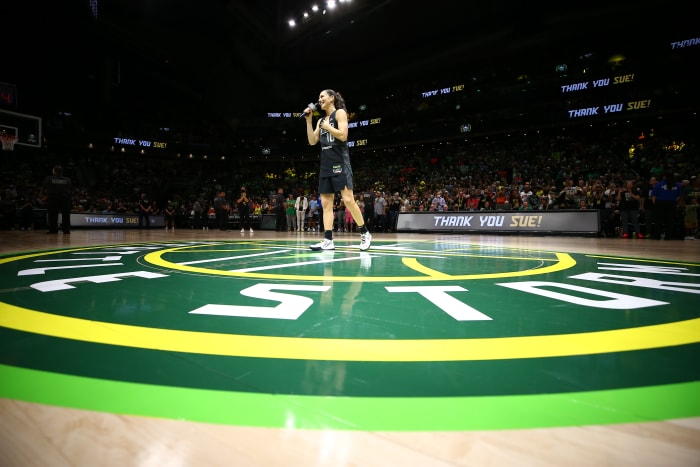
“Listening to that speech really confirms who she is,” Kelley writes. “… Just about everybody thought she was talking to them.”
Lindsey Wasson/NBAE/Getty Images
The next morning, the filmmaker drops by his favorite coffee shop, where his barista friend is slinging coffee. Very Seattle, per the stereotype.
Shaw already knows the basics of the barista’s story: Sarah Rose moved to Seattle in 2008 and ran a teen summer camp at the Ballard Community Center where, on a field trip in the summer of ’10, she screamed and cheered while listening to Bird’s second championship triumph on the radio. When she heard crickets in response, she decided to become a WNBA fan, as a form of activism.
Bird returned her loyalty. Bird earned her trust. Bird somehow always managed to see the bigger picture, whether on the fast break, in a divided U.S. or while belting out Mary J. Blige. Bird was a gay icon, inclusive and welcoming. Reason 4.
On that day, the morning after, Shaw simply notices the barista’s T-shirt. It’s an homage to a “local treasure,” Rose says, with red lights and stiff drinks and an ever-crowded dance floor. For years, she continues, it was the only lesbian bar on the West Coast. But that’s not why she wore it. She wore it because she heard Bird’s speech. She, too, had arrived in a city she didn’t know well, before she knew who she really was. She, too, fell in love with a place that encouraged everyone to express themselves. Bird’s experience was, in some ways, her experience. Bird’s acceptance was, in other ways, hers as well.
The shirt reads: Wildrose.
When the first president of the WNBA stepped down in 2005, she left behind a league positioned for the future. What kind of future? No one knew for certain. But Val Ackerman believed that Bird’s generation would obliterate even the most optimistic of expectations. She knew that UConn stars bolstered interest in women’s basketball, especially in the Northeast. She loved their rivalry with Tennessee grads. She even handed Bird and her Storm teammates the franchise’s first trophy.
Still, she never could have foreseen Bird outlasting not only her successor but two other presidents. She couldn’t have predicted the Storm remaining in Seattle, or the growth of the WNBA. It wasn’t linear, or easy. But the league entered this season with viewership up for the 2021 finals (by 40% compared to ’19) and the draft (by 20% from last year). The league banked $75 million from its first capital raise, as investors like Condoleezza Rice and Laurene Powell Jobs joined in. The current commissioner, Cathy Engelbert, came from Deloitte, where she served as the company’s first female CEO. Television ratings continue to tick upward. Players earn higher salaries due to the CBA that Bird shaped as vice president of the players association.
“There were years where it seemed like the league wasn’t getting the respect it deserves,” Ackerman says. “That finally changed, and it has a lot to do with the assertiveness of the players. Sue deserves a lot of credit for shepherding the league through different stages.”
There’s Reason 5 in the case for Bird. The handoffs she has made, the momentum she has culled, the impact that will live far longer than her career, than even her. “Maybe,” Ackerman says, “this is just the beginning.”
Proof: Sabrina Ionescu, the Oregon star turned Liberty point guard and first-time All-Star. She’s 24 years old, or only four years senior to Bird’s professional basketball career. She grew up watching Bird, in the literal sense. Now, she enjoys a higher salary, a larger fan base and a league in the middle of the moment, and she knows precisely why.
“Her generation taught us we can achieve what most think is impossible,” Ionescu says.
Three days after Bird’s regular-season finale in Seattle, I’m on The Mike Salk Show, slotted in, like the world’s worst warm-up act, before retired NFL quarterback Brock Huard and Mariners general manager Jerry Dipoto. The great Bird debate begins with the list of her challengers, a deep pool that we limited to 12: five Mariners (Ken Griffey Jr., Edgar Martinez, Randy Johnson, A-Rod, Félix Hernández), three Sonics (Kemp, Payton, Lenny Wilkens) and three Seahawks (Steve Largent, Jones, Russell Wilson).
The disclaimer: Of course, other local luminaries were also worthy. Like Cortez Kennedy, Kenny Easley, Marshawn Lynch, the entire Legion of Boom, Gus Williams, Jack Sikma, Ray Allen, Detlef Schrempf, Lauren Jackson, Breanna Stewart and many others. Our 12 simply rise above their (also worthy) counterparts in the argument for who stands alone atop a Mount Rainier of Seattle sports.
Besides Bird, only four of the other 11 athletes on the list played their entire careers in Seattle—Hernández, Martinez, Largent and Jones. A-Rod was never beloved and bolted early. Johnson pitched for five other teams, scowled, killed a bird with a fastball and won a championship … with Arizona.
Although mid-1990s-Sonics basketball still resonates for cultural impact alone, Kemp played almost half of his career—six of 14 seasons—in other cities. Payton wore the jerseys of five other teams. Both played in only one NBA finals, losing to the Bulls in ’96. They’d only better Bird’s impact if combined.
The winnowing eventually leaves Griffey as her primary competition. Griffey willed Seattle’s love affair with baseball. It’s not a stretch to say he kept the Mariners in town. He made the city a national destination for superstar athletes. He came back to coach. He helped form Jackie Robinson Day when he wore 42 in April 1997. Like Bird, he changed his sport, franchise and city. His impact, like Bird’s, was global and local, widespread and confined, felt everywhere but nowhere more than here.
“It would be hard for me to not put [Griffey] number one,” Salk says. “He became a national phenomenon.”
He also left. He also never won a World Series.
Perhaps a consensus could not be reached.

“She made people I know, from all walks of life, come together,” Crawford says of Bird.
Steph Chambers/Getty Images
Perhaps it could.
“At the very top,” Hughes says, in regard to where Bird belongs.
“She’s at least on the top shelf,” Crawford says. “We watched her grow, from UConn graduate to one of the faces of the WNBA to an ambassador for our sport. There’s just a different connection that comes out of that. It’s more than stardom. It’s joy, like with Allen Iverson and Philly. She made people I know, from all walks of life, come together.”
“She’s kind of transcendent,” Kelley says.
“Seattle was rockin’ today for Sue Bird last home game!” LeBron James posted on his Twitter account.
Then there’s Jeff Ament, the bassist for an iconic band and a member of the Rock and Roll Hall of Fame. He’s also a basketball-obsessed, Seattle-sports-centric fanatic who once suggested the name “Mookie Blaylock” for the outfit that became Pearl Jam instead. Still, even a celebrity with access to just about anything actually just wants this: to meet Sue Bird.
“I’ve thought about it for 10 years,” Ament says while home in Montana between tour stops. “Like, how to reach out? I just want to shoot hoops with her.”
Recently, a realization dawned on Ament. How Bird played basketball gifted Ament real joy. She was unselfish, impenetrable, an artist who painted with the rock she slung back and forth with both hands, between her legs, behind her back, all while propelling the Storm’s offense like a puppeteer with invisible strings connected to her teammates. Ament describes Bird as “the perfect fit” for Seattle: lesbian, out, proud; liberal, political when necessary, outspoken as an advocate against social injustice; accomplished, driven; relatable, authentic; distinct, a genre of one.
Most impactful? Ever? “Yeah,” Ament says, without hesitation. “I mean, she played here for 20 years. Start getting that statue ready. I don’t think it’s even close.”
Maggie Mertens and Jeff Scott Shaw contributed reporting.
Watch the WNBA Playoffs with fuboTV.
More Daily Covers:
• MVP. Mama. Mortician: The Many Faces of Sylvia Fowles
• She Kicked for Vanderbilt, and Then Things Got Hard
• ‘A League of Their Own’ Endures Because It’s Personal












